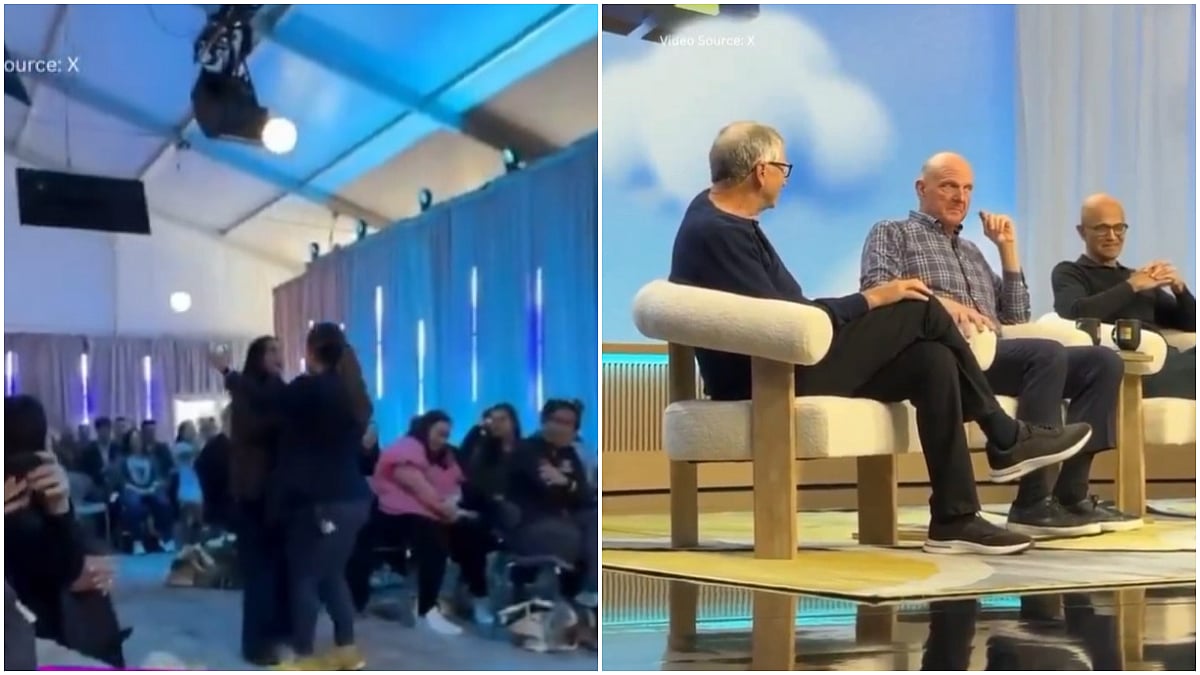vaniya agarwal: Indian-origin engineer resigns from Microsoft after challenging leadership on Palestine issue
An Indian-Origin Techie’s Bold Stand: Quitting Microsoft Over Palestine
Microsoft’s 50th anniversary celebration in Redmond
Last week, Microsoft’s 50th anniversary celebration in Redmond, Washington, took an unexpected turn. What was meant to be a milestone event honoring the tech giant’s legacy became a stage for dissent, as two employees disrupted proceedings with pro-Palestine protests. Among them was Vaniya Agrawal, an Indian-origin software engineer, whose dramatic confrontation with the company’s leadership has since made waves.
The event saw Microsoft’s past and present titans—Bill Gates, Steve Ballmer, and Satya Nadella—sharing the stage for the first time in a decade, joined by the newly appointed AI CEO, Mustafa Suleyman. It was a rare moment of unity for the company’s leadership, but it didn’t last long. Vaniya Agrawal, who had been with Microsoft as a Software Engineer II since September 2023, seized the opportunity to voice her outrage. She interrupted the proceedings, calling attention to Microsoft’s alleged role in supplying AI-powered tools to the Israeli military amid the ongoing conflict in Gaza.
Agrawal’s protest wasn’t a solo act. Earlier in the event, another employee, Ibtihal Aboussad, had stolen the spotlight during Suleyman’s keynote address. “Mustafa, shame on you,” Aboussad shouted, accusing Microsoft of hypocrisy. “You claim that you care about using AI for good, but Microsoft sells AI weapons to the Israeli military. Fifty-thousand people have died, and Microsoft powers this genocide in our region.” Before being escorted out, she threw a keffiyeh scarf—a symbol of Palestinian solidarity—onto the stage, leaving a powerful visual mark.
Agrawal’s moment came later, during a panel featuring Gates, Ballmer, and Nadella. Standing up, she didn’t hold back. “Shame on you all. You’re all hypocrites,” she declared. “Fifty thousand Palestinians in Gaza have been murdered with Microsoft technology. How dare you. Shame on all of you for celebrating on their blood. Cut ties with Israel.” Her words echoed through the venue as she was swiftly escorted out, with some attendees reportedly booing her exit.
But Agrawal didn’t stop there. Following her public outburst, she sent a company-wide email announcing her resignation, effective April 11. In it, she explained her decision: “Hi all, my name is Vaniya, and after 1.5 years as a software engineer at this company, I’ve decided to leave Microsoft. You may have seen me stand up earlier today to call out Satya during his speech at the Microsoft 50th anniversary. Here’s why I decided to leave the company, and why I spoke up today.”
She went on to detail her growing unease with Microsoft’s ties to the military-industrial complex, particularly its reported $133 million contract with Israel’s Ministry of Defense. According to an Associated Press investigation earlier this year, Microsoft’s AI models, developed in partnership with OpenAI, have been deployed in an Israeli military program to identify bombing targets in Gaza and Lebanon. Agrawal argued that these technologies have fueled mass surveillance and indiscriminate attacks, contributing to the deaths of over 50,000 Palestinians since the conflict escalated in October 2023.
Before her time at Microsoft, Agrawal’s career path was diverse. She worked at Amazon in various engineering roles and held unconventional jobs like medical assistant, tea consultant, and pharmacy technician. A graduate of Arizona State University with a degree in Software Engineering, she also earned the prestigious Grace Hopper Scholarship, recognizing her contributions as a woman in computing.
The protests have cast a shadow over Microsoft’s milestone celebration, spotlighting a broader reckoning within Silicon Valley. Tech companies and academic institutions alike have faced criticism for their collaborations with Israel amid Gaza’s deepening humanitarian crisis, where nearly 2.3 million people have been displaced. Agrawal’s and Aboussad’s actions reflect a growing movement among tech workers unwilling to stay silent about their employers’ ethical choices.
As of April 6, neither Agrawal nor Aboussad had received official word from Microsoft about their employment status, despite Agrawal’s resignation notice. The uncertainty lingers, but their bold stand has already sparked conversations far beyond Redmond. For Agrawal, it’s a personal and moral line in the sand—one that led her to walk away from a promising career at one of the world’s biggest tech giants.


Comments
Post a Comment